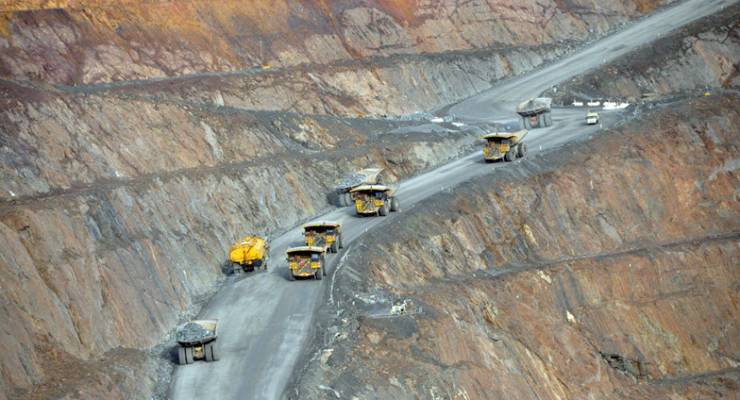
Mining giant Glencore has managed to keep its name more or less out of the news that the government has backed a proposal for a new coal-fired power plant in northern Queensland.
Which is interesting, given the company has been lobbying for a new “high efficiency, low emissions” (HELE) plant in Australia for some time now.
But Inq can reveal that the multinational is hoping to develop a coal supply agreement with Shine Energy, the company behind the recently announced $4 million government-backed feasibility study into the new plant in Collinsville.
The government’s support for the project follows an intense campaign led by rebel Nationals MPs, including former resources minister Matt Canavan, as well as Michelle Landry and George Christensen.
The announcement has driven a wedge into the Coalition over climate, even though experts say there is no market for the plant unless the government indemnified it to the tune of billions.
But it’s not exactly clear who has been pushing the project, and who stands to benefit the most from the proposal — if it ever goes ahead.
Shine Energy, a First Nations traditional owner company based in Brisbane, is responsible for the plan. Its chief executive, Ashley Dodd, has been campaigning for the plant alongside the Queensland Nationals triumvirate, spruiking the project on Andrew Bolt’s show last year.
Collinsville already has a decommissioned power plant, built in the ’60s, that was switched off in 2018. The town is also home to one of Australia’s oldest coal mines, which is owned by Glencore. The mine has been running on and off for almost 100 years and was most recently reopened in 2017.
The Australian reported last year that Shine’s proposal for a new power plant had received the initial backing of Glencore, which said it would provide the company with “project management and governance expertise during the feasibility phase of the project”.
In a statement to Inq, Glencore said while it did not have a financial stake in the project, it said a new plant, if viable, would benefit its supply chain.
“We have indicated we would consider a coal supply agreement to the project, given we have a mine located nearby,” a spokesperson said.
Glencore has done a lot of work to lobby for a new HELE plant in Queensland. In November, chief executive Ivan Glasenberg met with Prime Minister Scott Morrison to argue that a HELE coal-fired power station should be part of Australia’s energy mix as it transitions to renewables.
At the time, Glencore told The Australian Financial Review: “Glencore believes government policy should be extended to support all low emission technologies, including HELE and CCS [carbon capture storage] which can co-exist with renewables.”
Glencore would not say whether this discussion involved the Collinsville power plant. “Glencore meets with local, state and federal government officials from both major parties on a regular basis across a wide range of issues,” the spokesperson told Inq.
A new HELE plant has been part of Glencore’s “clean coal” agenda for some time. In a sustainability document from May 2018, it said its strategic response to climate change was to give “support for low emission technologies” including “advocating HELE technology”.
“HELE and CCS exist and are proven technologies; the economics will markedly improve with the right public policy backing — policy parity is required for this,” it said.
And then there’s Project Caesar. Project Caesar was Glencore’s secret, multimillion-dollar astroturfing campaign to prop-up coal demand by undermining environmental activists and spreading sophisticated pro-coal messaging on social media.
The campaign was uncovered by The Guardian last year, and was orchestrated by none other than world-renowned spin doctors the C|T group, the firm founded by Sir Lynton Crosby and Mark Textor.
The campaign was reportedly responsible for posts by the now-defunct Facebook group, Energy in Australia, which attacked renewables while supporting HELE coal plants through memes and graphics. The page’s posts were shared by George Christensen at the time.
Inq sought comment from Shine Energy.








Can somebody explain to the dumb and getting dumber coalition voters that coal is at record prices and Collinsville is still dying, from 20,000 people in the boom to 1900 now, a power station that employs very few people will make no difference to collinsville and it wont recover, it was a boom town and like most boom towns eventually dies , the smart people will leave and go elsewhere, the dumb ones will stay and listen to the LNP lies, the only reason the LNP and the Nat rats want a power station is to make more money for a foreign mining company and get their kickbacks, the rednecks have already sold most of Queenslands water to china, when the coal mines close those foreign companies will still own the water rights, so like our gas we`ll be forced to buy it back at crippling prices, WAKE UP YOU DUMB BASTARDS YOUR BEING SCREWED OVER AND OVER.
It would be nice to know what independent sources say about the Glencore assertion that HELE and CCS are proven technologies.
Queensland has the most modern coal fired power stations in Australia, four having been built since 2000. All are HELE and on average reduce emission by 10% compared to conventional power stations. Hardly enough to think HELE stations will address our emissions problem.
https://reneweconomy.com.au/clean-australias-clean-coal-power-stations-14224/
Follow the money. The rule hasn’t changed, the financial benefits will end up offshore and won’t accrue to the residents of North Queensland other than to a few select individuals and we won’t hear too much of that.
If we are to have coal-fired electricity generation then even the marginal benefit of HELE plants is obviously desirable. The laws of thermodynamics remain a significant obstacle: expect a push from within the LNP for their repeal.
As Turnbull said, “the Laws of mathematics do not override the Law of Australia!”